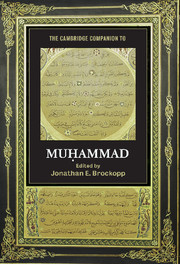Book contents
- Frontmatter
- Introduction
- Part I Muḥammad in his world
- Part II Muḥammad in history
- 4 The Prophet as lawgiver and legal authority
- 5 Personal piety
- 6 Muḥammad as the pole of existence
- 7 The Prophet Muḥammad in ritual
- 8 Muslim philosophers’ rationalist explanation of Muḥammad’s prophecy
- 9 Where earth and heaven meet: remembering Muḥammad as head of state
- Part III Muḥammad in memory
- Index of Quaran Verses
- General Index
4 - The Prophet as lawgiver and legal authority
from Part II - Muḥammad in history
Published online by Cambridge University Press: 28 May 2010
- Frontmatter
- Introduction
- Part I Muḥammad in his world
- Part II Muḥammad in history
- 4 The Prophet as lawgiver and legal authority
- 5 Personal piety
- 6 Muḥammad as the pole of existence
- 7 The Prophet Muḥammad in ritual
- 8 Muslim philosophers’ rationalist explanation of Muḥammad’s prophecy
- 9 Where earth and heaven meet: remembering Muḥammad as head of state
- Part III Muḥammad in memory
- Index of Quaran Verses
- General Index
Summary
Among Muḥammad's many sobriquets is that of lawgiver, al-shāri'. Although the term is ambiguous and can also refer to God, Muḥammad is deemed worthy of this epithet because of his role in transmitting the two revelatory textual sources that form the basis of Islamic law: Qur'ān and Ḥadītḥ The Qur'ān is the word of God but transmitted through Muḥammad's experience of revelation and first uttered by Muḥammad. Muḥammad is, thus, the immediate, though not the ultimate, source of Qur'ānic revelations. However, Ḥadīth, the corpus of traditions from the Prophet, although it is divinely inspired, represents Muḥammad's own, direct contribution to the material sources of Islamic law. Qur'ānic legislation is mostly terse, elevated in style, limited to relatively few legal topics, and of modest proportion. By contrast, traditions from the Prophet display a range of literary styles, treat numerous areas of the law (and much besides), and amount to a vast corpus of texts. / Early references to Muḥammad as a legal authority / The Qur'ān neither describes a specifically legislative role for Muḥammad nor systematically connects him with its legislation. In a few Qur'ānic passages, Muḥammad is connected with the enunciation of norms.
- Type
- Chapter
- Information
- The Cambridge Companion to Muhammad , pp. 83 - 102Publisher: Cambridge University PressPrint publication year: 2010
- 5
- Cited by



